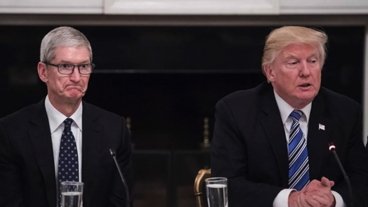The Chinese parliament has officially approved new electronic security legislation, due to go into effect in June 2017, which could force companies like Apple to make changes to how they handle their data infrastructure — particularly if they're concerned about privacy.
"Critical information infrastructure operators" must now store both personal and business data on Chinese servers, according to the new law, detailed by Reuters. While Apple has been storing some user data on Chinese servers since 2014, the company may now have little choice but to do so.
More seriously, those operators will now have to provide "technical support" to security agencies, and pass security reviews. The law also makes it illegal to use the internet to "damage national unity," providing official cover for pursuing dissidents.
Reuters noted that some of the law's provisions were already effective in practice, but that their codification comes alongside President Xi Jinping instituting a crackdown on groups like the media and civil rights lawyers. The Communist Party has been particularly focused on countering "historical nihilism," defined as rejecting the Communist revolution and/or its inevitability, or criticizing its trajectory.
In August, over 40 global business groups petitioned Chinese Premier Li Keqiang to amend some of the more controversial sections of the law.
The legislation could scare some companies away from doing business in China, but many like Apple may not be willing to sacrifice sales to avoid the hassle and potential violations of customer privacy.
 Roger Fingas
Roger Fingas








 Malcolm Owen
Malcolm Owen
 Christine McKee
Christine McKee
 Andrew Orr
Andrew Orr

 William Gallagher
William Gallagher











42 Comments
This is going to be difficult for Apple: abandon this giant market, or refute one of their own core principles...
Difficult and inconsistent to do these things in China, but a substantively different version of them in the U.S.
This is where senior executives at multinational corporations earn their paychecks.
Well this will be interesting.
Cook was prepared to defy the FBI in the US to protect privacy. Let's see how far he'll go in China.
They can't abandon this market but they need to fork the software to make clear elsewhere they're not caving. They can't abandon it because they need to continue to try and institute change and you can't do that if you don't participate.
Governments.